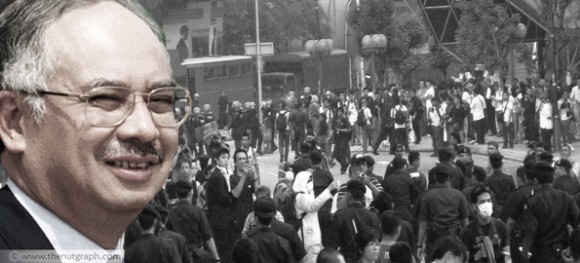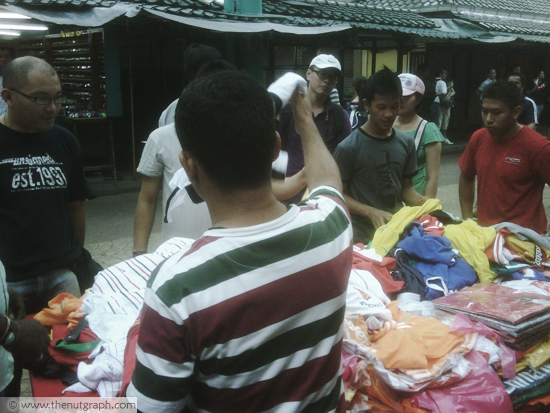
POST-Bersih 2.0 rally, what has Prime Minister Datuk Seri Najib Razak been saying to defend the government’s actions of repressing dissent?
It would seem that since the 9 July 2011 rally and after arresting more than 1,900 people, including detaining without trial six Parti Sosialis Malaysia (PSM) members, Najib’s responses have been disingenuous, narrow-minded, and even dangerous.
What, then, do his statements tell us about Najib’s leadership and what we can expect further from his administration?
Why repress dissent?
According to Najib, the government had to act in the way it did against Bersih 2.0 because it had a duty to “protect the interests and property of the larger community” in Kuala Lumpur. That presupposes that having peaceful rallies is detrimental to public interest and will damage properties.
We know this to be untrue. While non-peaceful demonstrations can and do damage public and private property and disrupt public order, peaceful demonstrations actually have the potential to do two things. One, they ensure that the right to peaceful assembly and to freedom of expression is upheld. And two, they can and do generate business.
This is what happens here in Malaysia and in foreign cities when the police cooperate with rally organisers to ensure a smooth and safe demonstration. And which is also what happened in KL on 9 July, albeit without police cooperation. Near Stadium Merdeka, an ice-cream seller did brisk sales, as did a t-shirt vendor on Petaling Street as the crowd started to gather on the morning of 9 July.

A tiny hole-in-the-wall drinks stall close to Petaling Street was swamped by thirsty Bersih 2.0 supporters around lunchtime. And the staff at the McDonald’s outlet in the area told me after the rally had dispersed that evening that business had been non-stop. Indeed, according to Bersih 2.0’s estimate, if the police had allowed the street demonstration to take place without locking the city down, it could have generated up to RM6 million in economic activity.

Additionally, those who walked did not attempt to destroy property or harm others without provocation. Potential acts of confrontation and aggression were quickly contained and diffused. The thousands who participated in the rally or who had businesses or homes in the city will vouch that it was orderly and peaceful except for police action.
On Jalan Pudu, demonstrators sat down in front of the FRU trucks and officers only to be tear-gassed and sprayed with throat-constricting and blinding chemicals. And later, at Tung Shin Hospital, where I was trapped with fellow Malaysians after police shot tear gas and chemically laced water into the hospital compounds, the crowd chanted: “We want peace! We want peace!” The police responded with more tear gas and arrests within the hospital grounds.
Najib claims that the demonstrators provoked the police. We know that our premier is not stupid. But is he honest? Unless sitting down and asking for peace constitutes provocation, our prime minister is being plain untruthful in saying the things he’s been saying.
Dangerous diatribe
Why is the diatribe from Najib and the other Umno ministers so dangerous? Because what the Najib administration is doing, including through Umno-owned Utusan Malaysia, is to demonise moderate and intelligent voices. Just note the many incredulous ways in which the Barisan Nasional (BN) has vilified Bersih 2.0 and its supporters as everything but legitimate voices of reason.

That’s not all. The state detained without trial the six PSM leaders, including the much-respected doctor-turned-Member of Parliament (MP), Dr Michael Jeyakumar Devaraj, for more than a month without providing evidence of a crime. In the meantime, Najib and the Umno leadership have endorsed non-state actors such as Perkasa and silat groups who threaten violence and promise that they cannot control their members.
By silencing and crowding out sane and reasonable voices that appeal across the board, and endorsing those who randomly threaten non-Malays and non-Muslims, isn’t Umno creating an explosive situation? If moderate voices are being pushed out of the public sphere, doesn’t that only encourage more extreme views and measures so that the government will take notice? Especially since the government is clearly only willing to listen to those who have actually threatened the peace?
Additionally, Najib and his colleagues in government have consistently tried to rubbish Bersih 2.0’s demands and justify outlawing it by saying that the movement for free and fair elections is actually an opposition front. Even if that were true – and that is a matter of perception rather than fact – isn’t the opposition in a democracy a legitimate voice? Don’t opposition MPs have the right to voice their opinions and make reasonable demands as do other citizens?
And is the Najib administration saying that just because the opposition backs the call for free and fair elections, those demands are not legitimate no matter the evidence at hand? That’s like saying the demand for Saudi women to be able to drive themselves is baseless and should result in arrests and repression because the demands are being made by women.

That Najib and the BN are so keen to vilify and delegitimise the opposition merely for being the opposition is troubling at best and dangerous at worst. It suggests that the BN doesn’t believe in checks and balances. It demonstrates that it will not respect different views. It tells us that Najib was lying when he told British Prime Minister David Cameron “there was room for dissent” in Malaysia.
It is clear that Najib is not interested in listening to dissenting voices from citizens. That must be why he reportedly told Cameron to turn a deaf ear to those who were calling for free and fair elections in Malaysia.
What next?
Najib’s attitude and his government’s actions towards dissent are only brewing more trouble for his administration and for the country.
Firstly, because his administration’s reaction to Bersih 2.0 has been over the top, and increasingly disingenuous and incredible, the government is fast losing credibility, including internationally. In a 22 July statement, LawAsia aptly summed up the situation as such: “Aside from the evident breaches of basic human rights this signifies, it defies understanding that any government which claims to support the democratic process can maintain credibility amongst voters when it feels threatened to this extent by a movement whose stated aims and activities are to promote clean and fair elections through achievable reforms.”
And secondly, when moderate voices such as Dr Jeyakumar’s are locked up without trial, and a respected lawyer like Datuk Ambiga Sreenevasan is demonised repeatedly, and when citizens feel that reasonable dissent and demands will not gain traction, it isn’t too difficult to imagine what will fill the void.
Najib has claimed that it was Bersih 2.0’s intention to topple the BN and seize power even though there is no such evidence to back up his claim. But perhaps Najib is just giving voice to his own fears – that the BN can be toppled and that Umno can one day lose power.
If he were both smart and honest, he would know that if that happens, it won’t be because Bersih 2.0 decided to march peacefully. It would be because his administration tried to prevent the march, and continues to demonise, arrest, and, up to 29 July, lock up for more than a month those who make fair and legitimate demands of his government. ![]()
Jacqueline Ann Surin doesn’t want a prime minister who goes on a city walkabout or who will cut short his family holiday as a public relations exercise. She wants a leader who understands that freedom of assembly and expression can be upheld while protecting peace, property and public interest.


Littlebird says
Mmm..just wondering if the ice cream [seller] was an undercover cop? I find it rather unusual to see many ice cream vendors on 9 July.
Jacqueline Ann Surin says
@Littlebird, the thought crossed my mind when I was taking his picture 😛
Yen says
Thanks for this excellent piece, Jacqueline. I’ve shared it via Facebook and Twitter, and inserted a link to this story in my blog.
I especially like this one: “And is the Najib administration saying that just because the opposition backs the call for free and fair elections, those demands are not legitimate no matter the evidence at hand?”
Well done.
Jacqueline Ann Surin says
Thank you, @Yen.
Bad Rabbit says
I’m confused by this article.
*
What does Najib’s response to Bersih have anything to do with Bersih or Pakatan Rakyat? I’m sure he doesn’t spend five seconds at a time thinking about PSM, Ambiga or even Anwar; they had nothing to do with the Governments response.
*
The only opposition that Najib is worried about is opposition to his rule within UMNO. Pakatan Rakyat is not strong enough or organised enough to defeat Najib at the next general election.
*
However, a coalition of the DPM, Tun Dr. Mahathir and Perkasa would be more than enough to defeat Najib even before the general election.
*
The enemy needed to be defeated, Bersih was an excuse to defeat the REAL enemy…
JW Tan says
Ironically, the best way to prove that we are far from a democratic and civil society was to respond in a heavy-handed manner to Bersih’s demands. Dictators always make this mistake – that our ostensibly democratically elected leader who professes to believe in democracy made it is doubly troubling.
Andrew I says
British PMs must be quite envious of their Malaysian counterparts. In the back of their minds, they’re probably thinking: I wish I could do that.
Maggie Thatcher, perhaps, did the least wishful thinking of all. She definitely got on like a house on fire with some people. We’re not mentioning any names because that would be indiscreet.